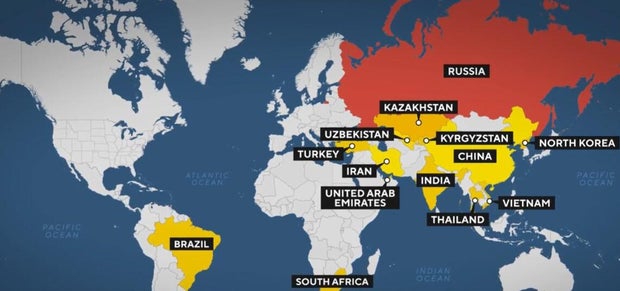Which countries could Trump hit with 100% tariffs over ties with Russia?

/ CBS News
More than a dozen countries from Asia to the Middle East and South America are potentially in President Trump's crosshairs if he goes ahead with his threat to impose 100% tariffs on goods exported to the United States over their economic ties with Russia.
"We're going to be doing very severe tariffs if we don't have a deal in 50 days, tariffs at about 100%," Mr. Trump said Monday at the White House, laying out a new ultimatum and deadline for Russia to agree to a ceasefire to end its war in Ukraine.
The levies, he said, would be applied as "secondary tariffs" — not targeting Russia directly, but designed to increase Moscow's economic pain by pressuring its trade partners to stop buying or selling products in the energy, agriculture and weapons sectors with Russia.
China and India became the world's first and second biggest importers of Russian oil in 2023 after Western sanctions were imposed against Moscow in response to its invasion of Ukraine in 2022. The top post had previously been held by the 27-nation European Union.
China and India, Asia's two biggest economies, now collectively import an estimated 85% to 90% of the seaborne crude oil sold by Russia's state-managed energy companies, which make up the bulk of its total exports.
After launching its full-scale invasion in February 2022, the Kremlin renegotiated prices with its trade partners, offering steep discounts on Russian oil compared to U.S. and European crude. NATO member Turkey is another major importer of Russian oil and natural gas.
In the Middle East, the United Arab Emirates — while not a major energy importer itself — serves as a financial hub for the international trade in Russian oil. Dubai is also a safe haven for Russian capital and oligarchs.

In South America, agricultural powerhouse Brazil is the biggest purchaser of Russian fertilizer products, crucial to supporting its soybean, sugar and coffee exports.
Vietnam and Thailand, both of which try to maintain diplomatic non-alignment in the Russia-Ukraine war — leaving them stuck in a delicate balancing act between their Eastern and Western trade partners — do have oil, natural gas, defense and tourism interests with Russia.
Senior Russian officials were quick to downplay the threat of secondary sanctions against its trading partners, and to reject Mr. Trump's ultimatum as "unacceptable."
The president's remarks didn't cause any immediately apparent unease for Russian investors, either, possibly as Mr. Trump left a window of 50 days for some new agreement to take shape, and as he has a recent history of stepping back from previous tariff threats.
After Mr. Trump warned of the possible 100% secondary tariffs, Russia's stock market rose 2.7%, and the value of the Russian rouble actually strengthened relative to the dollar.
Ramy Inocencio is a CBS News foreign correspondent based in London, covering Europe and the Middle East. He joined the Network in 2019 as CBS News' Asia correspondent, based in Beijing and reporting across the Asia-Pacific, bringing two decades of experience working and traveling between Asia and the United States.
Cbs News




